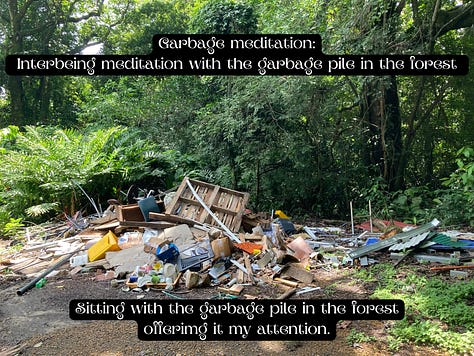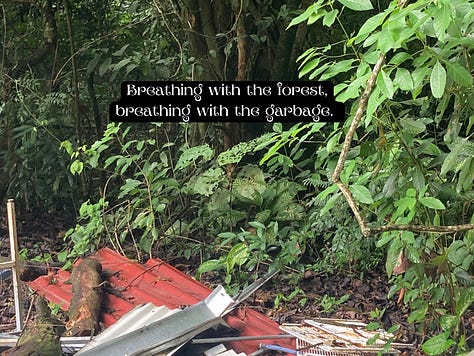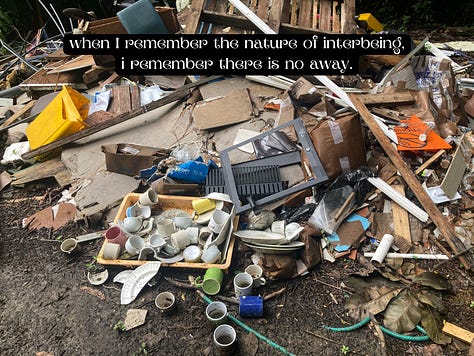The forest is right outside my office, and there is a trail I walk often, where we found the forest pedestal that has become our altar and ceremonial space. I repeat my steps on this path, getting to know it, tracing this path again and again to get to know this place, to try to listen deeply to it.
The path goes to a creek which doesn’t run during the dry season, but these days is flowing again. The path passes two abandoned maintenance buildings which do not appear to have been used for a while.
One day, outside the buildings, I noticed a giant pile of trash. A dump-sized pile.
I had to wonder: had it been there all along and I somehow hadn’t noticed it? Or had it recently been put there?
Due to its enormity, I think I would have noticed it before, so I think it was a recent development. Either way, the sight of the trash heap at the edge of the forest is a stark contrast.
And it makes me think a lot about interbeing.
How we might want to dwell in our interbeing with the forest, but less so with the trash. How we might want to tune into our interbeing with all that is beautiful and fecund and vital, but less so with what is wasted, destroyed, on the other end of the cycle.
How we might want to think, “How dare they!” (whoever put it there, who was probably just doing their job), without reflecting on the trash that we contribute that goes somewhere we can’t see (but still goes somewhere).
How we might think, “How could this end up in these beautiful woods!” when really, where else is it supposed to go?
Interbeing means entanglement with everything. Everything. Even what we wish would just go away, what we would rather not look at. Perhaps especially what we would rather not look at, which might be what we need to look at the most.
Perhaps especially when it is a part of us. The garbage is a part of us. It came from us, was made by us and discarded by us. So what does the garbage pile at the edge of the forest say about me, us? How might we live differently if we were forced to confront - to be with - our garbage piles? If they weren’t taken away, where someone elses (human and more-than-human) are forced to very intimately confront them?
I am offering this reflection from a place of curiosity: I wonder how we might live if our garbage didn’t get to go “away.”
At the recent HDHS Colloquium where I spoke about re-enchanting and reimagining education, I talked about how important it is to re-enchant education, and how modern formal schooling tends to dampen enchantment and curiosity rather than enable them, which I think is vitally important for generating liveable worlds in which all beings can thrive. But disturbance is also an equally important pathway of learning, and learning to stay with the trouble (Donna Haraway) and sit with complexity, complicity, and discomfort (Gesturing Towards Decolonial Futures Collective) are critically important skills for building more liveable futures and presents.
At this moment, if you are paying attention to things happening in the world, it might be easier to be disturbed than enchanted, hence my focus here on enchantment, beauty, wonder, awe. However, we also don’t want to lose sight of the disturbances, what we can learn from them, and being able to sit with them long enough to really feel into that discomfort. Perhaps if we do, we might be able to act differently (not necessarily better, but at least differently, with greater care and love). Interbeing means holding both, the beauty and the disturbance, the forest and the garbage pile.
With that, I offer you this garbage-forest meditation, an invitation to sit with our garbage, stay with the trouble, and develop our muscles for sitting with discomfort, complicity, and complexity. I wrote this little meditation which you can click through, or listen to the recording (which also invites you into the chorus of afternoon sounds of my balcony in Costa Rica :). It is short - perhaps too short to stay with the trouble! But I invite you to lean into it and extend it in your own ways.






Invitation: meditate on your garbage. With your garbage, about your garbage. Next to your garbage, among your garbage. You don’t need to analyze it or think about it, just be with it. Be aware of it, rather than turning away from it.




